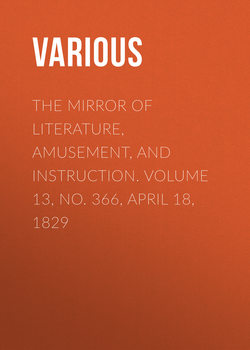Читать книгу The Mirror of Literature, Amusement, and Instruction. Volume 13, No. 366, April 18, 1829 - Various - Страница 4
HARROW SCHOOL
ORIGIN OF SIGNS.—CAT AND THE FIDDLE
Оглавление(To the Editor of the Mirror.)
No part of the history of civilized nations is involved in such deep obscurity as the origin and progress of their names. I do not mean their names of men and women, the etymology of which are easy; for any stupid fellow can see with half an eye that Xisuthrus and Noah are one and the same person; and that Thoth can only be Hermes; nor is there any discernable difference between Pelagius and Morgan; tout celà va sans se dire, but when we come to account for the names of places or of signs, then indeed are we lost in a vast field of metaphysical disquisition and conjectural criticism. The Spectator, your worthy predecessor, threw much light upon the science, but still he left it in its infancy. To be sure, he traced the Bull and Mouth to the Boulogne Mouth, but I don't remember that he made many other discoveries in this terrâ incognitâ. However, he hinted that the roots of most of these old saws were to be found in the French language, or rather in the jargon spoken by the would-be-fine people, in imitation of the court, and by them called French. Neither the Spectator, however, nor any of his periodical imitators have ever found out why a certain headland, bare as the back of my hand, should be dignified with the appellation of Beechey Head; unless indeed, according to the Eton grammar, our ancestors used the rule of lucus a non lucendo. The reason, however, is to be found in the French language, and Beechey Head is the present guide of the old beau chef, whereby this point was once known. The Spectator also, if I remember right, declared the old sign of the Cat and the Fiddle to be quite beyond his comprehension. In truth, no two objects in the world have less to do with each other than a cat and a violin, and the only explanation ever given of this wonderful union, appears to be, that once upon a time, a gentleman kept a house with the sign of a Cat, and a lady one, with the sign of a Fiddle, or vice versâ. That these two persons fell in love, married, and set up an Inn, which to commemorate their early loves, they called the Cat and the Fiddle. Such reasoning is exceedingly poetical, and also (mind, also, not therefore) exceedingly nonsensical. No, Sir, the Cat and the Fiddle is of greater antiquity. Did you ever read the History of Rome? Of Rome! yes, of Rome. Thence comes the Cat and the Fiddle, in somewhat a roundabout way perhaps, but so it is:
Vixtrix causa Diis placuit, sed victa Catoni.
Cato was faithful to the sacred cause of liberty, and disdained to survive it; and now for the fiddle. In the days of good Queen Bess, when those who had borne the iron yoke of Mary, ventured forth and gloried in that freedom of conscience which had lately been denied them, a jolly innkeeper having lately cast off the shackles of the old religion, likened himself to the old Roman, and wrote over his door l'Hostelle du Caton fidelle. The hostelle and its sign lasted longer than the worthy gentleman, and having gone shockingly to decay, was many years after re-established. But alas! the numerous French words once mixed with our language had vanished, barbarized, and ground down into a heterogeneous mass of sounds; and le Caton fidelle was no longer known to his best friends when resuscitated under the anomalous title of the Cat and Fiddle!!
XX.
